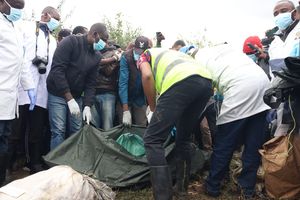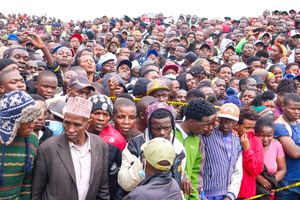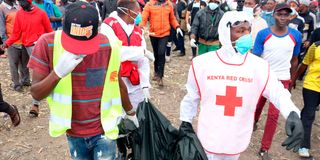
Kenya Red Cross officials carry a body bag with sacks retrieved from the Kware dumpsite in Pipeline on July 13, 2024.
The air is thick with a choking stench as each gunny bag containing dead bodies is retrieved from Nairobi’s quarry of death in Mukuru Kwa Njenga Slums in Embakasi.
But the stench, or the circumstances of death, or who those dead people were, how they were killed in what appears to be a similar manner, their bodies wrapped in the same way in polythene sacks and reinforced with nylon ropes, is just the beginning of the dark secret here.
It goes deeper. Even the number of dead people here is in dispute.
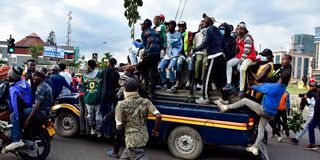
Youths hang on to a police vehicle as it arrives at the City Mortuary reception area on July 13, 2024, to deliver bodies recovered from Kware area for forensic examination.
While the police, who had said on Friday, July 12, that they had retrieved six bodies — way below the nine as claimed by the State-funded police oversight agency — the number of those bodies picked on Saturday, July 13 was even more controversial.
Sunday Nation witnessed five sacks of what appeared to be human remains being picked from the quarry, with witnesses and locals swearing there could be more bodies given the dismemberment.
Back to Embakasi.
Here, an angry crowd of youth surrounded the Directorate of Criminal Investigations (DCI) homicide detectives, who were working under immense pressure to recover more bodies from the garbage-filled quarry opposite Kware police station.
The DCI homicide team’s every move was scrutinised by the impatient mob.
The bodies, found wrapped in sacks and polythene bags and tied mostly with ligatures, is a difficult sight. As the fifth gunny bag was retrieved, the stench became unbearable.
The rotting bag was torn, revealing the soles of human feet and toes, sparking further anger and causing the crowd to grow more unruly.
"This one is a human body. Open it; we want to see whose body is in this gunny bag," a young woman shouted angrily.
The police, DCI detectives, and recce squad struggled to push the crowd back as a total of five gunny bags were retrieved.
President William Ruto promised action.
"The team should conduct comprehensive investigations and ensure the killers face the full force of the law," said President Ruto in Elgeyo Marakwet, emphasizing that his administration will not condone any form of extrajudicial killings.
The President put the figure of those bodies retrieved at nine — another dark secret. DCI last evening promised to act.
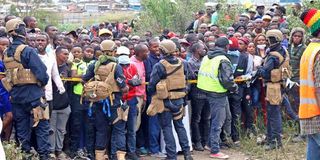
Police maintain security around the quarry in Embakasi on July 13, 2024, where bodies were discovered dumped on Friday.
“Three bags contained female body parts as follows: the first bag had two legs from the knee downwards, the second bag contained two body parts, one from the neck to the waist and another from the head to the waist, and the third bag contained a lower limb from the thigh to the knee. For the other two bags, one contained a dog carcass while the other was full of garbage,” DCI said.
Dr Ruto’s directives followed public outcry over claims of extrajudicial killings by police during recent anti-government protests by Gen Zs, where 39 demonstrators were suspected to have been killed by police.
The discovery of the bodies in Mukuru kwa Njenga came amid a troubling surge in mysterious disappearances and abductions, particularly following protests against the Finance Bill 2024.
On the second day at the quarry on Saturday, July 13, the crowd grew increasingly impatient due to the slow pace of the retrieval. Diver Kyalo Wambua has been retrieving the bodies for two days.
"Yesterday, (Friday) I retrieved eight bodies — all women. Today, I’ve retrieved five bodies — all women. The bodies are at different stages of decomposition, but one retrieved today was badly decomposed. All the bodies have been dismembered and cut in half to fit into the sacks," Wambua explains.
"Some bodies had decomposed, while others seemed recently dumped. This appears to be an ongoing issue," said Hussein Khalid, the director at Haki Africa.
The detectives face the challenge of piecing together the cause and motive of these killings.
"The National Police Service needs to do more to protect Kenyans," Mr. Khalid added.
Mr Wambua noted that they were mainly searching at the edge of the quarry pits. "No one has moved inwards. The challenge is that the quarry dam has maggots, and we lack protective gear apart from this rope and gloves."
Forensic investigators
Irungu Houghton, the executive director at Amnesty International Kenya, informed journalists that all eight bodies collected on Thursday were women in their 20s. "We hope that pathologists and forensic investigators can tell the nation what is happening, as 13 bodies have been recovered in about 24 hours."

Detectives label sacks that had been retrieved from Kware dumpsite in Pipeline, Nairobi, on July 13, 2024.
Wangechi Grace, the Executive Director at the Independent Medico-Legal Unit (IMLU), confirmed, "Six of the eight bodies retrieved from the quarry on Thursday are at the City Mortuary. We are trying to confirm where the other two are preserved. Five bodies were collected today."
She added that the discovery underscores the urgent need to address human rights violations and ensure citizen safety. To report any human rights violations, Kenyans can contact IMLU or the Kenya National Commission of Human Rights (KNCHR) at 0800721501.
The Civic Freedoms Forum (CFF) and Police Reforms Working Group-Kenya (PRWG-K), an alliance of organizations committed to professional, accountable, and human rights-compliant policing, have urged the government to prioritize the investigations and ensure no evidence is lost.
They also called on the public not to interfere with the bodies to preserve forensic evidence for identifying the victims and pursuing justice.
"Security apparatus should not interfere with the bodies. Preserving evidence is crucial for closure," noted Ms Wangechi.
Additional reporting by Barnabas Bii

